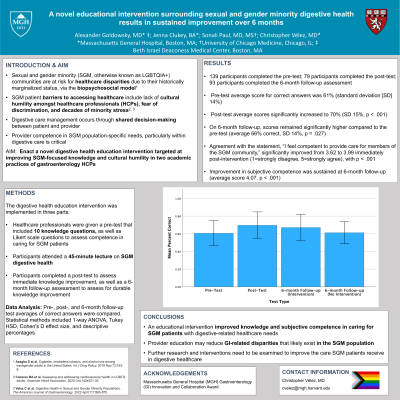Tuesday Poster Session
Category: Practice Management
P4075 - A Novel Educational Intervention Surrounding Sexual and Gender Minority Digestive Health Results in Sustained Improvement Over 6 Months
Tuesday, October 24, 2023
10:30 AM - 4:00 PM PT
Location: Exhibit Hall

Has Audio
- CV
Christopher Velez, MD
Center for Neurointestinal Health, Massachusetts General Hospital
Boston, MA
Presenting Author(s)
Alexander Goldowsky, MD1, Jenna Clukey, BS2, Sonali Paul, MD, MS3, Christopher Vélez, MD4
1Boston Medical Center, Boston, MA; 2Massachusetts General Hospital, Boston, MA; 3University of Chicago Medicine, Chicago, IL; 4Center for Neurointestinal Health, Massachusetts General Hospital, Boston, MA
Introduction: Prior studies have shown sexual and gender minority communities experience barriers accessing and engaging with healthcare communities. Some include lack of cultural humility amongst providers and staff, fear of discrimination, limited provider understanding of how to care for these communities, and sustained minority stress. There has yet to be an intervention targeted at improving knowledge and cultural humility regarding digestive health in sexual and gender minority communities in non-trainees.
Methods: Participants included faculty physicians in gastroenterology at two institutions, gastroenterology trainees, advanced practice providers, endoscopy and operating room nurses and technicians, clinic nurses, and administrative staff. They were given a pre-test of 10 knowledge questions, and Likert scale questions about competence in caring for sexual and gender minority patients. Participants then attended a 45-minute lecture on sexual and gender minority digestive health, after which they completed a post-test to assess immediate knowledge improvement. Participants then completed a 6-month follow-up assessment to assess for durability of response. Pre- and post-test averages of correct answers were compared to assess objective knowledge acquisition. Statistical methods include ANOVA, Tukey, and descriptive percentages.
Results: A total of 143 participants completed the pre-test, 79 completed the post-test, and 93 completed the 6-month follow-up. Pre-test average correct answers was 61%, while post-test average significantly increased to 70% (p< .001). On 6-month follow-up, average percent correct was 66% (p=.027 compared with pre-test). When participants were asked how strongly they agreed with the statement, “I feel competent to provide care for members of the sexual and gender minority community,” this significantly improved from 3.62 to 3.99. (1=strongly disagree, 5=strongly agree, p=.033). This persisted at 6 months (average 4.07, p=.007).
Discussion: A lecture-based intervention with the goal of improving knowledge and competence in digestive healthcare for sexual and gender minority communities leads to significant increases in knowledge and competence in caring for this healthcare disparity community with durable effects at 6 months, though with slight knowledge regression. This can be used as a starting point for future educational interventions in sexual and gender minority digestive health and as a model for other specialties to improve the care these patients receive.
Disclosures:
Alexander Goldowsky, MD1, Jenna Clukey, BS2, Sonali Paul, MD, MS3, Christopher Vélez, MD4. P4075 - A Novel Educational Intervention Surrounding Sexual and Gender Minority Digestive Health Results in Sustained Improvement Over 6 Months, ACG 2023 Annual Scientific Meeting Abstracts. Vancouver, BC, Canada: American College of Gastroenterology.
1Boston Medical Center, Boston, MA; 2Massachusetts General Hospital, Boston, MA; 3University of Chicago Medicine, Chicago, IL; 4Center for Neurointestinal Health, Massachusetts General Hospital, Boston, MA
Introduction: Prior studies have shown sexual and gender minority communities experience barriers accessing and engaging with healthcare communities. Some include lack of cultural humility amongst providers and staff, fear of discrimination, limited provider understanding of how to care for these communities, and sustained minority stress. There has yet to be an intervention targeted at improving knowledge and cultural humility regarding digestive health in sexual and gender minority communities in non-trainees.
Methods: Participants included faculty physicians in gastroenterology at two institutions, gastroenterology trainees, advanced practice providers, endoscopy and operating room nurses and technicians, clinic nurses, and administrative staff. They were given a pre-test of 10 knowledge questions, and Likert scale questions about competence in caring for sexual and gender minority patients. Participants then attended a 45-minute lecture on sexual and gender minority digestive health, after which they completed a post-test to assess immediate knowledge improvement. Participants then completed a 6-month follow-up assessment to assess for durability of response. Pre- and post-test averages of correct answers were compared to assess objective knowledge acquisition. Statistical methods include ANOVA, Tukey, and descriptive percentages.
Results: A total of 143 participants completed the pre-test, 79 completed the post-test, and 93 completed the 6-month follow-up. Pre-test average correct answers was 61%, while post-test average significantly increased to 70% (p< .001). On 6-month follow-up, average percent correct was 66% (p=.027 compared with pre-test). When participants were asked how strongly they agreed with the statement, “I feel competent to provide care for members of the sexual and gender minority community,” this significantly improved from 3.62 to 3.99. (1=strongly disagree, 5=strongly agree, p=.033). This persisted at 6 months (average 4.07, p=.007).
Discussion: A lecture-based intervention with the goal of improving knowledge and competence in digestive healthcare for sexual and gender minority communities leads to significant increases in knowledge and competence in caring for this healthcare disparity community with durable effects at 6 months, though with slight knowledge regression. This can be used as a starting point for future educational interventions in sexual and gender minority digestive health and as a model for other specialties to improve the care these patients receive.
Disclosures:
Alexander Goldowsky indicated no relevant financial relationships.
Jenna Clukey indicated no relevant financial relationships.
Sonali Paul: Intercept – Grant/Research Support. Target PHarmaSolutions – Grant/Research Support.
Christopher Vélez indicated no relevant financial relationships.
Alexander Goldowsky, MD1, Jenna Clukey, BS2, Sonali Paul, MD, MS3, Christopher Vélez, MD4. P4075 - A Novel Educational Intervention Surrounding Sexual and Gender Minority Digestive Health Results in Sustained Improvement Over 6 Months, ACG 2023 Annual Scientific Meeting Abstracts. Vancouver, BC, Canada: American College of Gastroenterology.
